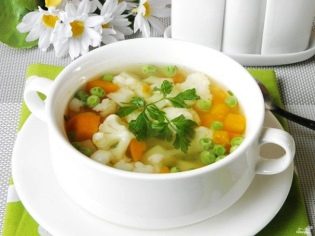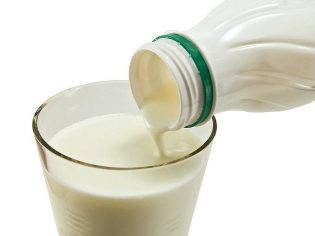Diet "Table number 3" M. I. Pevzner - weekly menu for children
Chronic diseases of the digestive system are the most common diseases in young children and adolescents. In the structure of childhood morbidity in some countries, they even occupy a leading place. In our country every day, doctors put new diagnoses of chronic diseases of the gastrointestinal tract in young patients.
When is the appointment indicated?
All systems of therapeutic nutrition were developed by the famous doctor and scientist M. I. Pevzner. He scientifically substantiated that the use of specific useful and the exclusion of products dangerous for the child’s body helps to reduce the number of exacerbations of chronic diseases of the gastrointestinal tract in children, as well as prevent the emergence of new ones.
Diet number 3 is shown to kids who have:
- Chronic inflammatory diseases of the stomach and intestines. More often this gastritis and enterocolitis with symptoms constipation or diarrhea (as well as their combination or alternation).
- Damaged end areas of the colon. It can be a variety of cracks and enlarged hemorrhoids.
- Digestive diseases associated with the occurrence of meteriozm or abdominal bulging due to increased formation of gas in the intestine. The impaired bowel function makes it difficult to regularly empty and discharge accumulated toxic gases.
Fundamental rules
Diet number 3 is aimed at correcting the existing disorders in the body associated with reduced bowel function. It is balanced enough for all the necessary nutrients.
The basic principles of diet include:
- Nutrient Ratio: 40% - protein products, 45% - carbohydrates, 15% - healthy fats. Among the protein products should be distinguished lean meat, poultry or fish. All of them are quality sources of good animal protein. From vegetable protein you should choose those foods that can cause less gas formation (for example, beans). It can be boiled and used as a side dish for meat or added to the soup.
- The basis of carbohydrates should be a variety of cereals. Oatmeal has an excellent laxative effect. In its composition, it contains a large amount of plant fiber, which makes the intestines work much faster.
- It is necessary to exclude all kinds of refined foods. The more fiber in food, the better for intestinal motility. Fiber is a natural catalyst of the bowels. It promotes gentle cleansing, expelling all processed food debris. If there is a lot of fried food and few vegetables in the diet, the intestines begin to work more slowly. The child has constipation.
- Sufficient drinking mode. A small child needs as much water as is necessary to compensate for all the liquid he spends during perspiration or breathing. In the summer, the body needs much more water. It is impossible to say unequivocally about how much a child should drink. It depends on his age, time of year, and also on the region where he lives. A seven-year-old child will need much more water than a three-year-old baby. Pay attention if your child asks to drink or is thirsty. Be sure to give him clean water at room temperature.
What should be added to the diet?
It is worth eating foods and dishes:
- bread from wheat flour yesterday's pastries;
- soups mainly vegetable;
- low-fat varieties of meat, fish, poultry;
- fermented milk drinks;
- buckwheat groats, millet, barley in the form of crumbly porridges;
- beets, carrots, tomatoes, cucumbers, zucchini, pumpkin, cauliflower;
- raw fresh sweet fruits and berries in increased amounts;
- honey, jam, marmalade;
- soaked dried fruits (prunes, dried apricots, figs);
- decoction of wild rose and wheat bran, fruit and vegetable juices.
What should be excluded from the menu?
Exclude from the diet the following foods and dishes:
- high-grade flour bread, buns;
- fatty meats, fish, poultry;
- smoked food, canned food;
- rice, semolina, vermicelli, legumes;
- radish, radish, garlic, onions, mushrooms;
- jelly;
- blueberry, quince;
- chocolate;
- cream products, spicy and fatty sauces;
- horseradish, mustard, pepper;
- cocoa, strong tea;
- animal and cooking oils.
How to make a menu?
The third Pevzner diet helps to normalize the work of the entire intestine, accelerates its motility and the promotion of food through the gastrointestinal tract. It also helps to slow down the putrefactive and fermenting reactions in the gut. This diet helps to normalize the correct and healthy intestinal microflora, cure dysbacteriosis.
In drawing up the menu, focus on the preferences of the child. If he likes cereals and vegetables more, he should not overload his food with meat products.
Example
Monday
- Breakfast: Oatmeal flakes cereal with dried fruit.
- Lunch: Fruit salad of various fruits with raisins.
- Dinner: Soup with turkey meatballs and vegetables. Salad of white cabbage and carrots.
- Afternoon tea: Carrot casserole with dried apricots.
- Dinner: Pink salmon cutlets with buckwheat porridge. Cucumber salad with bell peppers and parsley.
Tuesday
- Breakfast: A curd casserole with banana.
- Lunch: Kissel from pears with a dry low-fat biscuit.
- Dinner: Cabbage soup made of sour cabbage with a piece of young lean beef.
- Afternoon tea: Yogurt with prunes.
- Dinner: Baked hake in its own juice with boiled potatoes. Salad of grated carrots and apples.
Wednesday
- Breakfast: Homemade granola with dried fruit and milk.
- Lunch: Yogurt with apple and banana.
- Dinner: Vegetable soup with broccoli and fish balls.
- Afternoon tea: A glass of kefir.
- Dinner: Chicken meatballs with buckwheat. In addition - Peking cabbage salad with orange and carrot.
Thursday
- Breakfast: Millet porridge with banana and dried apricots.
- Lunch: Cottage cheese casserole.
- Dinner: Oven baked cod with vegetable garnish of seasonal vegetables.
- Afternoon tea: Carrot and walnut salad.
- Dinner: Pollack dill with cucumber salad.
Friday
- Breakfast: Corn porridge on milk with a little butter.
- Lunch: Pear and prune fruit salad.
- Dinner: Broccoli soup with chicken meatballs.
- Afternoon tea: Cheese soufflé with sour cream.
- Dinner: Chicken breast cutlets with green bean puree.
Saturday
- Breakfast: Carrot-curd salad with raisins.
- Lunch: Cupcake of oatmeal with kefir.
- Dinner: Chicken stewed with vegetables. In addition - millet porridge.
- Afternoon tea: Steamed prunes.
- Dinner: Buckwheat porridge with vegetable gravy.
Sunday
- BreakfastBarley porridge with boiled egg.
- Lunch: Carrot salad with green grated apple.
- Dinner: Soup from young cabbage. Turkey meatballs with buckwheat.
- Afternoon tea: Home-made cottage cheese with raisins and dried apricots.
- Dinner: Courgettes baked with chicken balls.
Kids love it when the plate is decorated with pieces of vegetables or fruit.
Diet number 3 is aimed at correcting changes in all diseases that occur with a decrease in intestinal motor function. Regular adherence to such a diet will prevent the development of constipation in the child and normalize the chair.
For details on products that help with constipation, see the following video.



























